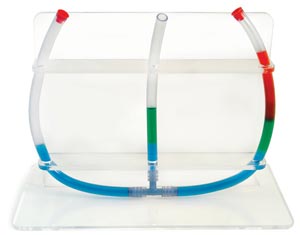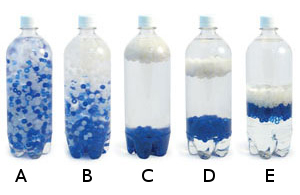 by: Tami O’Connor
by: Tami O’Connor
Why do some objects float while others sink? Archimedes discovered that an object is buoyed upward with a force equal to the weight of the fluid displaced. An object will float in a fluid whenever its weight is less than the weight of the fluid displaced; otherwise it will sink… So what does this mean in English??? An easier way to think about it is that an object that is less dense than the fluid it is in will rise to the top of the more dense fluid.
 In demonstrations of liquids of varying densities, the liquid with the greatest density will sink to the bottom of the container while the less dense liquid will remain on the top. There are wonderful demonstrations you can conduct with your class using immiscible liquids (liquids that do not mix) of different densities, and there are a number of high interest experiments your students can conduct using liquids of different densities. If you find this topic interesting, please visit the blog we wrote on the W-Tube.
In demonstrations of liquids of varying densities, the liquid with the greatest density will sink to the bottom of the container while the less dense liquid will remain on the top. There are wonderful demonstrations you can conduct with your class using immiscible liquids (liquids that do not mix) of different densities, and there are a number of high interest experiments your students can conduct using liquids of different densities. If you find this topic interesting, please visit the blog we wrote on the W-Tube.
Gasses also have varying densities, but in the elementary and middle school classrooms, students don’t often have the same opportunity to work with gasses as they would liquids, or more often, liquids and solids. Read the rest of this entry »




 Posted by Tami O'Connor
Posted by Tami O'Connor